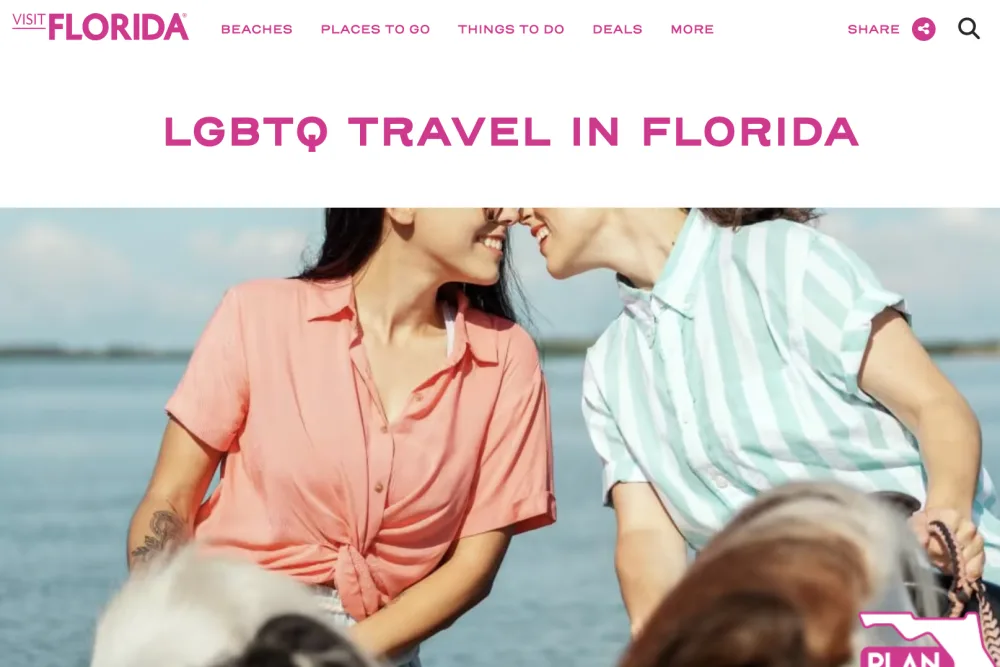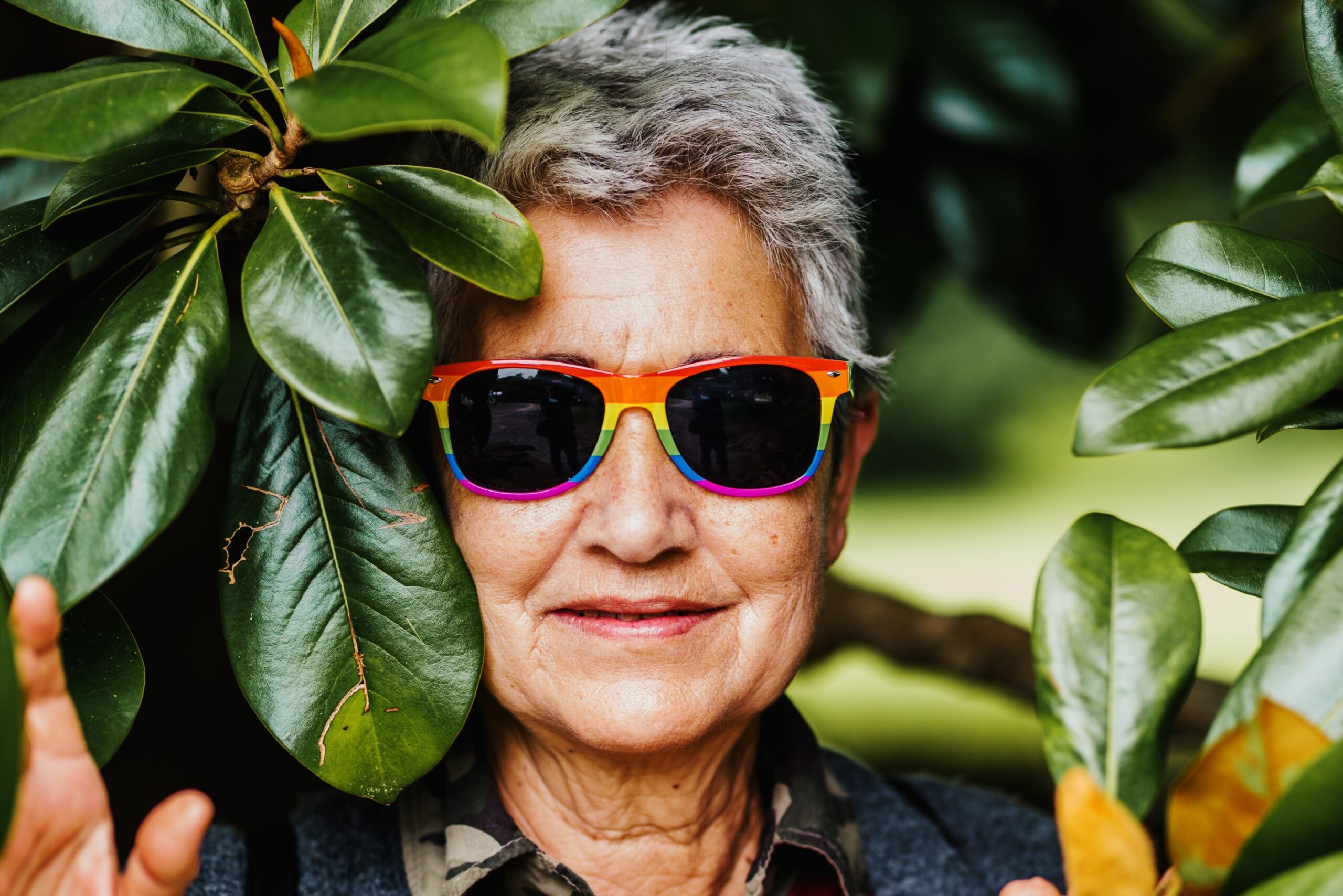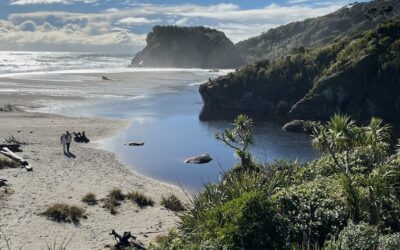Featured image: Why did Florida remove LGBTQ+ content when tourism is so important to its economy? / Photo: by Meniphoto via Envato
Do LGBTQ+ travellers feel welcomed in Florida?
by Kathy Buckworth
Florida State Tourism Board’s site “Visit Florida” has deleted the pages dedicated to resources and destinations for the LGBTQ+ community.
It can be hard (and complicated) to say to your grandkids that you’re not going to take them to DisneyWorld because it’s located in Florida, and you don’t agree with their current state government policies. And yes, it’s hard to resist an invitation from a friend or family member who offers up their condo in Florida when it’s freezing cold up here in Canada, declining for the same reason.
But let’s say you decide to put politics aside and travel to Florida, only to discover that the Florida State Tourism Board’s site “Visit Florida” has recently deleted the pages dedicated to resources and destinations for the LGBTQ+ community. How easy and attractive and welcoming it is to visit now?
You can still find LGBTQ+ information on the site if you search for it. So why remove the pages?
In 2023, Canada was the top international source market for Florida, representing 28% of all international visitors to the state, according to a Visit Florida report. Yet last year, Canada updated its travel advisory for the U.S., warning that “some states have enacted laws and policies that may affect” LGBTQ people traveling in the country.

An Internet archive screenshot of Florida’s LGBTQ+ page, now removed / Source: NBC News
Why the LGBTQ+ pages were removed
Florida Governor Ron de Santis defended the removal of the dedicated pages, stating “Our view as a state is we’re the best place to visit. We’re open to all but we’re not going to be segregating people.” Critics have pointed out that the site still maintains pages marketing to other distinct groups such as Latinos and African Americans.
“It’s just disgusting to see this,” Keith Blackburn, who heads the Greater Fort Lauderdale LGBT Chamber of Commerce, told the Associated Press. “They seem to want to erase us.”
The removal of these pages directly affects those businesses who would like to send a message to the LGBTQ+ community that their custom is welcome.
“It certainly makes me angry,” executive director of the Stonewall National Museum Robert Kesten said in an interview. “There is no reason to discredit a group of people that drive tremendous amounts of tourist dollars into the state.”
They asked for, and received a refund from “Visit Florida”, on the basis that they will lose tourism traffic to their library of over 30,000 books supporting the LGBTQ+ community. They have ended their 10-year relationship with the tourism board.
Losing tourism dollars is tough, but what’s even tougher is the challenge facing the many people in the LGBTQ+ community who have made Florida their home, and who have worked hard to successfully gain acceptance in their own towns and cities. While same sex marriages are legal in Florida (have been since 2015), recent bill passages which restrict the healthcare of the trans community are making it harder for this community to feel welcome. Both as visitors, and as residents.
What can we do as travellers?
It’s relatively easy for a traveller to choose not to go to Florida, or even for this travel reporter to not cover events or take press trips sponsored by Florida, but for residents of the state who are appalled and hurt and confused by this latest move, what can be done? What can we do?
For one, travel media can promote the places in the state of Florida where the LGTBQ+ community is not only welcome but celebrated. Where it counts is where the people are.

The home page of the Stonewall Museum in Ft. Lauderdale, Florida / Credit Stonewall Museum
What should Florida do?
Moving forward, how can “Visit Florida” make things right with the LGBTQ+ community?
“Money should be refunded, an apology should be made and the pages should be reinstated,” said Stonewall’s Kesten.
As travellers, discovering and sharing destinations, restaurants, hotels, resorts, activities and entertainment facilities that recognize and support the LGBTQ+ community will continue to acknowledge the inclusiveness that still exists within Florida, even if you have to search for it.
LGBTQ+ Friendly websites
There are specific tourism boards within Florida that have pages dedicated to LGBTQ+ tourists:
The National Stonewall Museum (located in Fort Lauderdale), here. (And donate here.)
LGBTQ+ Miami | Miami & Miami Beach (miamiandbeaches.com)
Fort Lauderdale LGBTQ Travel Resources | Visitor Information (visitlauderdale.com)
LGBTQ+ Travel Guide | Visit Jacksonville
LGBTQ+ Travel Guide to Orlando | Events & Things to Do (visitorlando.com)
Tallahassee Pride | Visit Tallahassee
Conquer With Pride | Visit Tampa Bay
Learn more:
Home (gulfcoastlgbtqcenter.org)
LGBTQ – Support & Social Group USA (lgbtqsupportandsocialgroupusa.org)
More On LGBTQ+ Travel
The Canadian Passport: Proud to be “X” Rated
Only 18 countries offer an “X” on passports, and Canada is one of them, ranking as the seventh best passport in the world.
New Zealand’s Wild West: Untamed Wilderness on the South Island
Running down the spine of the South Island of New Zealand is the Southern Alps and the untamed wilderness of rainforest and wetlands – think the wild west!
Lesbian Travel: Finding Your Place in the World as a Lesbian Traveller
Lesbian travel isn’t just a niche market, says Ginny Lunn of WalkingWomen; it’s a profound commitment to every woman who seeks safe spaces.







Let’s start promoting Unity. Let’s stop “dividing” or “diversifying” our population. Diverse comes from the word Divide, Unity comes from the word Unite. Adults are free to do what they want. That means they are free to disagree. It’s not hate, it’s just disagree, and isn’t that what freedom is all about?
Diverse isn’t about division, it’s about recognizing and honouring our differences. In doing so we have an opportunity to appreciate all that is available to us, rather than one way of living.
Etymology. From Old French divers, from Latin diversus (“various, different”), also written divorsus, past participle of diverto, divortere (“to turn or go different ways, part, separate, divert”); see divert.